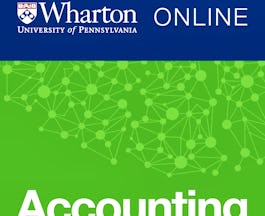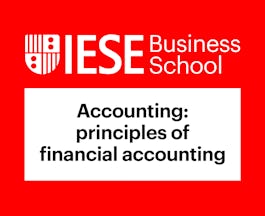Choose the Accounting Course That Aligns Best With Your Educational Goals

University of Pennsylvania
Skills you'll gain: Accounting, Accounts Payable and Receivable, Finance, Financial Accounting, General Accounting, Generally Accepted Accounting Principles (GAAP), Account Management, Cash Management, Cost Accounting, Financial Analysis

University of Pennsylvania
Skills you'll gain: Accounting, Finance, Financial Accounting, General Accounting, Financial Analysis, Generally Accepted Accounting Principles (GAAP), Accounts Payable and Receivable, Cost Accounting, Account Management, Cash Management, Decision Making, Estimation, Investment Management, Taxes, Budget Management, Management Accounting, Problem Solving, Mathematical Theory & Analysis, Mathematics, Data Analysis, Strategy and Operations

IESE Business School
Skills you'll gain: Accounting, Financial Accounting, Finance

Skills you'll gain: Accounting, General Accounting, Financial Accounting, Business Analysis, Data Analysis, Financial Analysis, Cash Management, Finance, Financial Management, Accounts Payable and Receivable, Cost Accounting, Inventory Management, Accounting Software, Sales, Taxes

University of Virginia
Skills you'll gain: Account Management, Accounting, Accounts Payable and Receivable, Finance, Financial Accounting, Financial Analysis, General Accounting, Generally Accepted Accounting Principles (GAAP), Cost Accounting, Payments
 Status: Free
Status: FreeYale University
Skills you'll gain: Finance, Investment Management, Risk Management, Banking, Behavioral Economics, Critical Thinking, Decision Making, Financial Analysis, Innovation, Underwriting, Leadership and Management

University of Illinois at Urbana-Champaign
Skills you'll gain: Accounting, Financial Analysis, Cost Accounting, Management Accounting, Financial Accounting, Leadership and Management, General Accounting, Finance, Account Management, Financial Management, Generally Accepted Accounting Principles (GAAP), Accounts Payable and Receivable, Business Analysis, Decision Making, Data Analysis, Entrepreneurship, Strategy and Operations

Coursera Project Network
Skills you'll gain: Finance, Microsoft Excel

Intuit
Skills you'll gain: Accounting, General Accounting, Accounting Software, Finance

University of Illinois at Urbana-Champaign
Skills you'll gain: Accounting, Financial Accounting, General Accounting, Generally Accepted Accounting Principles (GAAP), Financial Analysis, Finance, Accounts Payable and Receivable, Financial Management, Management Accounting, Cost Accounting, Leadership and Management, Account Management, Corporate Accouting

University of Illinois at Urbana-Champaign
Skills you'll gain: Leadership and Management, Accounting, Finance, Financial Analysis, Financial Accounting, Business Analysis, Strategy, Data Analysis, Decision Making, Critical Thinking, Marketing, Financial Management, Strategy and Operations, Market Analysis, General Accounting, Taxes, Entrepreneurship, Generally Accepted Accounting Principles (GAAP), Investment Management, Management Accounting, Market Research, Regulations and Compliance, Communication, Mergers & Acquisitions, Risk Management, Problem Solving, Cost Accounting, Probability & Statistics, Corporate Accouting, Digital Marketing, Business Development, Data Management, Account Management, Business Process Management, Accounts Payable and Receivable, Python Programming, Media Strategy & Planning, Exploratory Data Analysis, Marketing Management, Statistical Programming, Business Intelligence, Business Psychology, Behavioral Economics, Leadership Development, Data Visualization, Culture, Innovation, Audit, Business Transformation, Planning, Statistical Analysis, Banking, Securities Trading, Business Communication, Customer Analysis, General Statistics, Organizational Development, Product Strategy, Research and Design, Sales, Performance Management, Brand Management, Cash Management, People Analysis, Social Media, Product Management, R Programming, Correlation And Dependence, Creativity, Customer Relationship Management, Data Analysis Software, Human Learning, Machine Learning, Advertising, Process Analysis, Business Design, Negotiation, Design and Product, Influencing, Payments, Regression, Econometrics, Interactive Data Visualization, Change Management, Conflict Management, Human Resources, Marketing Design, Operational Analysis, People Management, Product Development, Product Marketing, Adaptability, Advertising Sales, Budget Management, Statistical Machine Learning, Contract Management, Project Management, Basic Descriptive Statistics, Benefits, Big Data, Collaboration, Computer Programming, Emotional Intelligence, Employee Relations, Forecasting, Operations Management, Plot (Graphics), Probability Distribution, Securities Sales, Data Model, Product Design, Algorithms, Data Structures, Data Visualization Software, Statistical Tests, Storytelling, Supplier Relationship Management, Data Mining, Mathematics, Product Lifecycle, Visualization (Computer Graphics), Machine Learning Algorithms, Supply Chain and Logistics, Extract, Transform, Load, Visual Design, Databases, Entrepreneurial Finance, Game Theory, Accounting Software, Natural Language Processing, SQL, BlockChain, Data Architecture, Microsoft Excel, Writing

Coursera Project Network
Skills you'll gain: Data Analysis, Microsoft Excel, Data Management, Leadership and Management
Searches related to accounting
In summary, here are 10 of our most popular accounting courses
- Introduction to Financial Accounting: University of Pennsylvania
- Introduction to Finance and Accounting: University of Pennsylvania
- Accounting: Principles of Financial Accounting: IESE Business School
- Intuit Academy Bookkeeping: Intuit
- Financial Accounting Fundamentals: University of Virginia
- Financial Markets: Yale University
- Fundamentals of Accounting: University of Illinois at Urbana-Champaign
- Create a Financial Statement using Microsoft Excel: Coursera Project Network
- Bookkeeping Basics: Intuit
- Financial Reporting: University of Illinois at Urbana-Champaign










